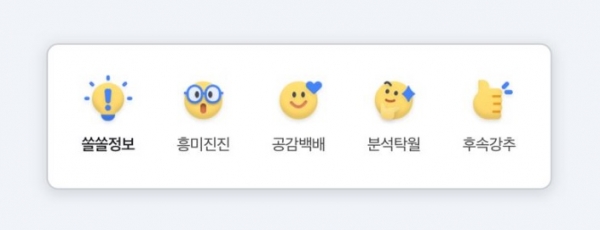Do you have your own criteria on how far freedom of expression is allowed? Whether the expression is positive or extremely negative, it has caused many untoward incidents in the entertainment industry in the past. However, now that the means of expression have changed so drastically, ST would like to find out more in detail what other problems have emerged ..................................Ed
The media, where freedom of expression was once seen as a virtue, is now slowly but surely losing the capability to express it. A recent example of such a step in the wrong direction is the action search engine site Naver took against misinformation and hate comments. Sometimes, the comments section on internet articles are locked from posting as a means to prevent things such as the dissemination of personal information, misinformation, and hate speech. As such, the only method of readers to show feedback on such articles are “emote stickers,” emotes that express opinions such as “happy,” “angry” and “sad.” Recently, however, Naver removed the original emotes and replaced them with ones that only feature positive comments, such as “excellent article,” “persuasive” and “interesting.” Naver claimed that this action was taken to receive better feedback on articles and deliver better content to the readers. Many readers, however, are not satisfied with this explanation, and express displeasure at their opinions being silenced.


The damage caused by cyberbullying, hate comments and misinformation are much more severe than one may expect. Choi Jin-sil, an actress who was once called “the nation’s sweetheart,” chose to end her life due to unfounded rumors and online harassment. Sulli, an actress who previously was a member of the a k-pop group f(x), suffered from depression due to online harassment, and made the same unfortunate choice. Their cases as well as a myriad of similar cases led the search engine site Naver as well as the media to restrict comments on certain articles as a measure against online hate. On the one hand, the entertainment industry welcomed the change due to the devastating impact hate comments had on the industry. On the other hand, however, they did not enjoy the lack of feedback and reduced attention the articles were getting. In addition, due to comment restrictions, some netizens talked about celebrities in articles unrelated to the topic, leading to confusion and fights in the comments sections.
However, Naver’s handling of the situation is not without its critics. Those who are critical of Naver’s decision claim that removing the dislike emote can prevent readers from expressing their disapproval or anger, thereby restricting freedom of expression, and has the potential to be abused to suppress criticism. An example that is held up is the case of YouTube. Tech giant YouTube also recently removed the dislike count from showing up in videos, claiming that small and marginalized creators suffer from ‘dislike attacks.’ However, YouTube creators, users, and even heads of influencer management companies have come out against this decision, claiming that the so-called dislike attacks against small and minority creators are rare, and the videos that suffer high dislike ratios are generally shown in videos made by large corporations and YouTube itself. In this sense, while removing the dislike function may seem minor, it can be abused to disguise the public outcry against certain content or actors, and that such a policy restricts freedom of expression.
There is also criticism against the search engine company as well as the media companies. The sensationalist articles and attention-grabbing headlines that media companies pump out in an attempt to win the Search Engine Optimization (SEO) battles against their competitors in the online spaces are not only unethical, but also drive harassment against already vulnerable individuals, such as victims of violent crime and marginalized groups. An example of such a case would be the case of Actor A (pseudonym) who was recently assaulted by their ex-partner with a deadly weapon. In the days following the incident, established mainstream media companies, including the largest newspaper in Korea, competitively revealed more and more information about the victim to drive engagement, leading to not only the victim but unrelated celebrities suffering harassment. Not only that, but many media companies actively platformed YouTube rumor mill channels that not only showed the face, name, residence but even the supposed site of the assault without any regard for the protection of the victim.
There is a clear need for a solution to the harassment vulnerable individuals suffer in the current media environment. However, as many argue, restricting the ability to show dislikes is a non-solution that does not tackle the problem in the slightest, and merely restricts the ability to express negative opinions, often to the benefit of those in power. To stop such harassment, media companies as well as search engines must review their content policies and act against harmful content that drive harassment and harm against those who are in a vulnerable position.
Jeon Min-young (News Editor)
sharonmy@soongsil.ac.kr
Min Jeong-ung (ST Cub-Reporter)
redreboot@soongsil.ac.kr


